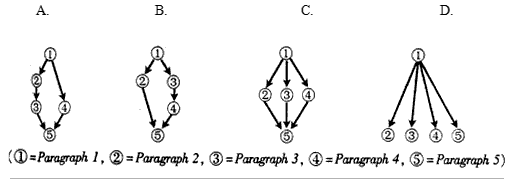閱讀理解。
While IQ (Intelligence Quotient) tells you how smart you are, EQ (Emotional Quotient) tells you how well
you use your smartness. Professor Salovery, the psychologist who created the term, EQ, says that it is IQ
that gets you hired but it is EQ that gets you promoted.
Supported by his research, he suggested that when predicting future successes, a person's brainpower, as
measured by IQ tests, might actually matter less than a person's character, or EQ. Professor Salovery may be
correct. For example, have you ever wondered why some of the best and smartest students in your class end
up failing exams? Perhaps it is because of their EQ. People often make the mistake of thinking that EQ is the
opposite of IQ. It is not. Although it is hoped that people have both high EQs and IQs, there is little doubt that
those with low EQs have a hard time surviving in life.
For a long time, researchers discussed if a person's IQ could be raised. The geneticists said no, while the
social scientists said yes. Furthermore, the social scientists said that it was possible to improve a person's EQ,
particularly in terms of "people skills", such as understanding and communication.
Recently, a professor released the findings of a study on senior high school students. When some normal
students were introduced to some disabled students, they found that afterwards they were more willing to help
people in difficulty. At the same time, there was a marked change in the disabled students' attitudes. They
became more positive about their disabilities and were more eager to try new things. People with high EQs
often have positive attitudes towards life and are open to different ideas, so they tend to be more creative in their
thinking. Please remember that having a high IQ is helpful but having a high EQ might even be more helpful.
1. According to Professor Salovery, what factor matters the most in predicting whether a person will be successful or not?
A. How a person tests his/her brainpower.
B. A person's character.
C. How smart a person is.
D. A person's IQ.
2. The second paragraph tells us that ____.
A. people who have a high IQ always have a high EQ
B. EQ is the opposite of IQ
C. people who have a low EQ tend to have a hard life
D. people who have a high EQ always have a high IQ
3. What did the professor find from his study of normal students being introduced to some disabled children?
A. Students with disabilities were not open in trying new things.
B. There was no change in the normal students.
C. The disabled students became more positive and more eager to try new things.
D. The disabled students were more willing to help others.
4. Which of the following is the writer's attitude toward EQ and IQ?
A. IQ is more helpful to people than EQ.
B. IQ can be raised by understanding and communication.
C. EQ can get people hired.
D. A high EQ is of great benefit in getting people promoted.
5. Which of the following would be the best title of this passage?
A. A person's brainpower.
B. IQ, EQ and success.
C. IQ and a person's character.
D. A person's IQ and EQ.

